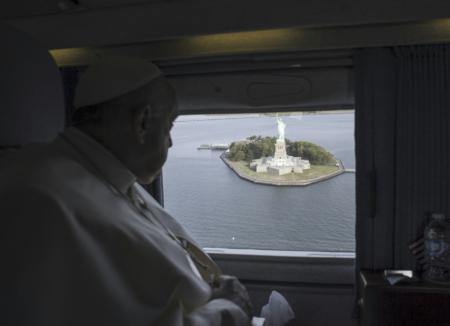Father to the world
Pope Francis is back in Rome, probably catching up on sleep before the synod bishops arrive. On this side of the Atlantic, though, everyone is still talking. I think they'll be talking for a very long time.
Certainly, there is a great deal to remember and savor about the papal visit to the United States. The experience was uplifting for everyone who attended last week's events in Washington, New York, or Philadelphia. Because what many in the media call "the Francis effect" is real, it was also inspiring for those of us who watched from work or home.
But the Holy Father's journey was more than just exciting or historic. It was a joyful shot in the arm of the whole American Church. Mercy, love, encounter. Pope Francis made us all feel like we were hearing what we had hoped, but never expected, to hear. It's a lot like when a father says, "I love you." So longed-for and significant that it's life-changing.
Words of love come easily to this pontiff. They weren't hard for Jesus either. But hearing them said so freely and so widely can challenge us, especially when mercy and love are spoken to those who don't even consider themselves part of the family. Especially if it's our father who's speaking.
I know that some very sincere Catholics were disappointed that Pope Francis did not scold Congress or make the issues of abortion or gay marriage the centerpiece of his remarks. Instead, he chose to discuss the Golden Rule, highlight the examples of two American Protestants, (Abraham Lincoln and Martin Luther King Jr.), and two left-of-center Catholics with less than laudable pasts, (Dorothy Day and Thomas Merton). To more than a few, his address to the United Nations General Assembly was even more baffling. I can understand why.
Still, what the Holy Father said at the U.N. was, philosophically speaking, extraordinary. Beginning with a concern for the environment he shares with his audience, Pope Francis led everything -- and everyone -- back to God. It was a brilliant argument, one most fully articulated in his encyclical, ''Laudato Si'.''
First, Pope Francis equated care for the environment as care for creation. He then stated that care for creation must be done by a creature within it, and not from outside it. Noting that human beings are creatures, the Holy Father identified all humanity as part of creation made by the Creator. He affirmed that all nature should be both cherished and respected. On that basis, Pope Francis asserted that the created nature of the human person must, therefore, also be cherished and respected. The logical conclusion is that if respect is accorded to all that is natural, then it is also due to all people at every stage of their development.
Drawing his listeners to God, Francis argued that because all nature is sacred and we are part of nature, every one of us is also sacred. He observed that this sacredness is expressed in us as natural law, the law written in each of our hearts. This law teaches us how to be who we are by living in accord with the laws of created nature. Thus, every human being and all of creation is inextricably tied to the Creator. Whether we recognize it or not, the world -- and everyone in it -- belongs to God. It is ours to care for. The speech Pope Francis gave was essentially a reassertion of Genesis.
By meeting U.N. diplomats where their hearts and minds already are, the pope of the Holy See brought God into the conversation. He did so by connecting the dots his listeners had already accepted as true. In other words, our Holy Father reached out to the world as if he were their father, too.
Pope Francis's visit gave us a dose of the kind of affirmation and encouragement that can motivate us to speak and move beyond our comfort zones. That, in fact, is what I suspect he intended to do. We have a lot to learn from this Holy Father's example of dialogue and encounter. The pope has shown us that there is nothing to fear -- only brothers and sisters longing to hear and be heard. And souls to gain for Christ.
Jaymie Stuart Wolfe is a wife and mother of eight children, and a disciple of the spirituality of St. Francis de Sales. She is the author of "Adoption: Room for One More?", a speaker, musician and serves as a Children's Editor at Pauline Books and Media. Follow her on Twitter @YouFeedThem.
- Jaymie Stuart Wolfe is a Catholic convert, wife, and mother of eight. Inspired by the spirituality of St. Francis de Sales, she is an author, speaker, and musician, and serves as a senior editor at Ave Maria Press. Find Jaymie on Facebook or follow her on Twitter @YouFeedThem.



















